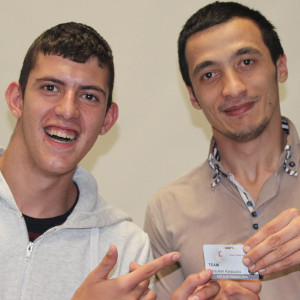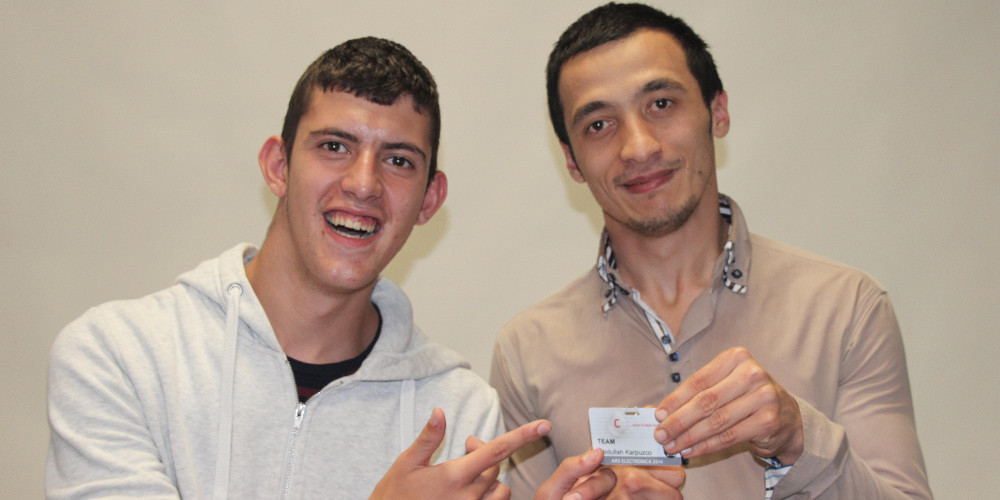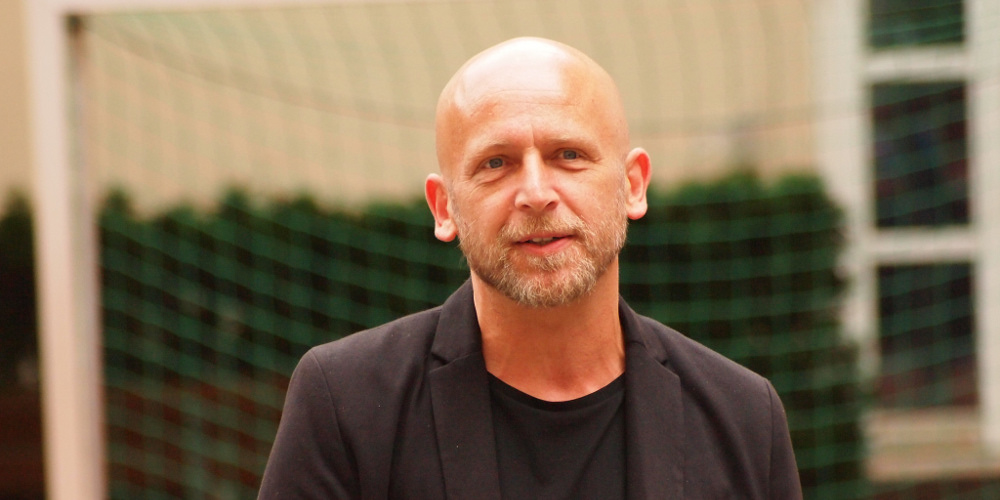This year, Ars Electronica wants to make a loud and clear statement in favor of integrating people with handicaps into “normal” working life. So, a decision was made in cooperation with FAB to take on two interns in the festival production crew.
This year, Ars Electronica wants to make a loud and clear statement in favor of integrating people with handicaps into “normal” working life. So, a decision was made in cooperation with FAB and in the spirit of the 2014 Ars Electronica Festival theme, “C… What It Takes to Change,” to take on two interns in the festival production crew. So, just like it says in most help-wanted ads, this internship really was an equal opportunity for people with handicaps.
The aim of this pilot project is to obtain feedback from both sides – employer and employee – as a means of improving and simplifying the integration of people with handicaps into professional life.
Our interns, Abdullah Karpuzco and Arber Tafilaj, have been working since July 15th every Tuesday from 9 AM to 12 Noon in the Ars Electronica Festival Office. The internship will end with a special WE GUIDE YOU TOUR of the 2014 Ars Electronica Festival, in which the two interns will play key roles.
We recently met with FAB liaison officer Christian Gigl and the director of the Ars Electronica Festival, Martin Honzik, to talk about this successful collaboration.
How important is it to integrate handicapped people into “normal” working life?
Christian Gigl: We consider it very important; otherwise, something like inclusion can never occur.
How did this collaboration with FAB come about?
Christian Gigl: About three years ago, Ars Electronica approached us about the possibility of cooperation in conjunction with the u19 – CREATE YOUR WORLD Festival.
Martin Honzik: Right. And that was the beginning of our cooperation with the BBRZ Group that FAB belongs to. After a feeling-out process that lasted 1-2 years, we went further into BBRZ’s structure and found what we were looking for at FAB. Why this is great for us as well as being a perfect fit for CREATE YOUR WORLD is simply put. The point is: technological aids make everyday life a lot easier for people with handicaps. Ideally, they can be completely integrated and become fully integrated citizens, and the technological framework conditions to make this possible are readily available here.
Christian, tell us a little about our two interns, Abdullah Karpuzco and Arber Tafilaj.
Christian Gigl: Both are participants in the FAB’s Virtual Office project, a three-year course to provide them with marketable skills in data processing.
What responsibilities did our interns assume?
Martin Honzik: A wide variety of tasks. Of course, when you get involved in a situation like this, it’s a challenge for both sides because our system, Ars Electronica’s system, is totally oriented on efficiency, good management and a structured operation, and, of course, the whole thing is based upon technological interfaces designed for people without handicaps. In light of this background, it wasn’t easy to find activities that would be a good match to their skills. So the search ultimately focused on our central organization, the portal, so to speak, to the Ars Electronica Festival. Accordingly, these were primarily administrative assignments.
Christian Gigl: In principle, people with handicaps can perform the same assignments as so-called people without handicaps.
Martin, how did it go, working together with the two interns?
Martin Honzik: Terrific. I think it’s been a win-win situation for both sides. I mean, the times I’ve seen our two interns and their body language while they were on the job … that was great! It was definitely the case that, as fully integrated staff members with specifically defined jobs to do, these young people had a different body language, a different attitude. They radiated pride! And conversely as well—their co-workers became cognizant of the fact that there are other life-worlds within the world in which we all live and that, to get along and achieve your goals in this world, you have to try to see things from other people’s perspectives. In this spirit, you have to make a little bit of an extra effort in order understand other people, especially those who see the world from a different point of view because they face other impediments, have other possibilities, have to deal with other challenges in everyday life. These people have a different language with another semantic background, and it’s incredibly interesting to deal with this.
This will come into play in the WE GUIDE YOU TOUR of the 2014 Ars Electronica Festival. What do you have planned here?
Martin Honzik: Exactly. We asked the folks at FAB—people who get around in wheelchairs—to take a look at our festival, to explore the venues, to get back to us about it, and then to repeat the whole thing as a guided tour. And in doing this, we’re fully aware of the fact that this year’s locations are not oriented on and equipped for the activities we’re planning to stage in them. This means that, although there’s barrier-free access, upon closer inspection, it becomes apparent that there are still certain hurdles and it will take some improvisation to surmount them. So we’re simply going ahead boldly and treating this as a learning experience. We realize that what we’re planning especially for people with handicaps isn’t 100% barrier-free.
Christian, is it possible for other companies to work together with FAB?
Christian Gigl: Of course it is. But a lot of companies shy away from this, maybe due to fear of the unknown.
Martin, what advice do you have for companies considering doing this?
Martin Honzik: I would tell any company or institution that this is the right thing to do. But whichever way you go this issue, you have to be clear about the fact that this is something that you consider on a different value level. Even if the objective is that people with handicaps have to be integrated in such a way that normal processes aren’t diminished with respect to efficiency, precision or speed, because, after all, it’s clear that the minority is on the outside looking in and the general perspective is dictated by the majority. It’s similar with this year’s festival theme, change. We’re bringing in people with expertise in a lot of different areas and deriving inspiration from their views of the world, and that’s exactly what we’re doing here. When you talk to the liaison officers and ask them to describe people with handicaps, they say that they’re the most ambition human beings they’ve ever met. Then, you just have to put 2 and 2 together and you immediately come to the conclusion that people who grow up in a minority have to try a little bit harder to make something of themselves. So, when such an individual gets the opportunity for integration, they bring with them an attitude like that of a top athlete. And of course this goes hand in hand with consequences such as egoism. This is something that comes with the territory.


